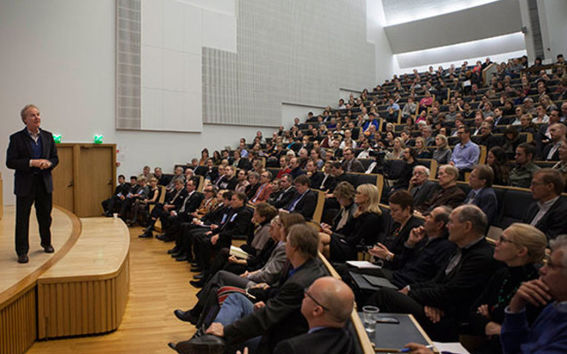Systems research changes the world for the better

The three-hour event presented the historical background of systems research, past and current research activities at the laboratory, and the aim of making systems intelligence a close-knit part of systems research. The event gave a wide perspective into why it is particularly important to understand the functioning of systems created by people in the ever more complex world.
Systems Analysis Laboratory, founded by Professor Raimo. P Hämäläinen, covers research areas such as mathematical theories, algorithms, and practical models for optimization and decision-making. Important topics include technological foresight and risk analyses for multiobjective and multiattribute decision-making. Research results are utilized in, for instance, developing and understanding environmental, societal, economical, and industrial systems. The laboratory has made both theoretical and practical contributions to developing systems research also toward applied philosophy, especially in the field of organizational research. The concept of systems intelligence was first coined in 2002.
Seeing through the eyes of the heart
A leading expert in organizational development, Peter Senge, gave a presentation that had a strong impact on many audience members. His message to the packed lecture hall was that life is impossible without constant connection and interaction with other people and our environment. The keyword is interdependency. Because people create the systems in which they live, it is vitally important to understand the connection between people and the environment in a systems intelligent way. Senge argued that while interdependency between people and the environment has increased, the understanding of this interdependency has decreased.
People tend to want to do the right, ethical thing. Nevertheless, it is not always possible to understand the wide-ranging impacts of our decisions, whereby we may unintentionally destabilize our environment. Examples of this include climate change, unsustainable use of natural resources, and the extinction of species. Senge proposed that by relying solely on our rational mind, we often fail to gain a deeper understanding.
If we are unable to assess the overall impacts of our complicated decisions, we can utilize the mathematical models and theories developed by our theoretical intelligence to account for the numerous interactions. These models and theories help us understand the consequences of our actions. The right decisions, however, are only made when our hearts are in it, too. The end results must take the future into account; that is, for instance, the benefit of our children and future generations. Even game theory proves that the maximization of the joint benefit is the best strategy. By respecting the nature and each other, the human race will continue to flourish on planet Earth.
The recipe for successful interaction
In his presentation, Esa Saarinen gave an everyday example on the eight-point program of systems intelligence. He told a story about a homeless couple he had met while taking a walk and about the brief conversation he had had with them. The woman in the couple had identified Esa and told him how wonderful it was to see him up and about and wished him well. Both parties left the situation elevated.
To utilize one’s systems intelligence – or, more commonly, situational awareness – in different contexts of interaction, it is important to identify the following factors: One should be able to see the systems around us and to act accordingly. One should attune to other people’s emotions and engage with emerging situations. One should try to elevate others and to take timely, appropriate actions. One should understand the importance of a positive attitude and the feedback it creates.
Raimo P. Hämäläinen, Peter Senge ja Esa Saarinen
Launching the book Being Better Better
Raimo P. Hämäläinen finished the seminar by introducing the book Being Better Better, written by himself, Rachel Jones, and Esa Saarinen. In the introduction of the book, systems intelligence is described as a learnable capability, which can be improved and which takes into account how people both influence and are influenced by the systems and societal structures within which they live. According to the authors, systems intelligence is a higher-level skill than emotional or social intelligence, which both contribute to systems intelligence. You can assess your own level of systems intelligence using a test developed at the laboratory: www.systemsintelligence.aalto.fi/test. The book is available for purchase at Akateeminen kirjakauppa
People walked out of the lecture hall at Otakaari 1 feeling happy and energized. The message of the seminar had had an impact on their lives.
The origins of systems research and related Nobel prizes
Systems studies were initiated during the second phase of the industrial revolution at the end of the 19th century by the Russian physician and philosopher Alexander Bogdanov. Different fields of systems science, such as operations research, optimization, and game theory, were developed around the 1950s.
In 1975, Leonid Kantorovich from Russia and Tjalling Koopmans from the U.S. were awarded the Nobel Prize in economic sciences for their contributions to the theory of optimum allocation of resources. In 1994, John F. Nash Jr. was given this award for his achievements in the field of game theory.
The presentations and videos from the seminar can be found on the Systems Analysis Laboratory website: http://sal30.aalto.fi/
Read more news
Soil Laboratory Exhibition – Exploring the Dialogue Between Human and the Earth in Utsjoki
Soil Laboratory explores the relationship between humans and the earth as a living landscape through ceramic practices in Utsjoki.
The Finnish Cultural Foundation awarded grants for science and art
A total of 15 individuals or groups from Aalto University received grants
Environmental Structure of the Year 2025 Award goes to Kalasatama-Pasila tramway
The award is given in recognition of meritorious design and implementation of the built environment. Experts from Aalto University developed sustainability solutions for the project.






